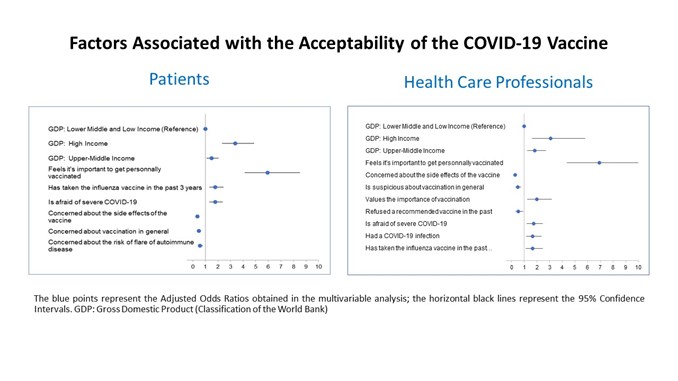Session Information
Date: Saturday, November 6, 2021
Title: Epidemiology & Public Health Poster I: COVID-19 & Vaccination (0084–0117)
Session Type: Poster Session A
Session Time: 8:30AM-10:30AM
Background/Purpose: The first COVID-19 vaccines were authorized in December 2020. However, their acceptability remains debated and has never been evaluated in patients with chronic rheumatic disease and health care professionals (HCPs) in the Arab countries. The primary objective of this study was to assess the acceptability of COVID-19 vaccines in patients with chronic rheumatic disease and HCPs in the Arab countries and to evaluate the factors associated with acceptability.
Methods: The ARCOVAX (Arab League of Associations for Rheumatology (ArLAR) COVID Vaccination study) utilized an anonymous web-based survey that was adapted from the VAXICOV study (1), translated to Arabic by the authors, and validated by the scientific committee of the ArLAR. The survey was disseminated online in three languages: Arabic, English, and French between April 13th and May 11th, 2021, through multiple social media platforms (Facebook, Twitter, Instagram, Snapchat), patients’ associations, mass emails from ArLAR and AAAA (Arab Adult Arthritis Awareness) group, WhatsApp messages to rheumatologists and patients, and direct invitation to patients while in the waiting room. Acceptability was defined by participants who were already vaccinated or willing to get vaccinated; non-acceptability was defined by participants who were undecided or refused to get vaccinated. Demographic and disease data, perceptions about COVID-19 vaccines were presented in numbers and percentages for categorical variables and means and standard deviations or medians and interquartile ranges for continuous variables, as appropriate. The factors associated with acceptability were evaluated using two separate binary logistic regression models for patients and HCPs, respectively.
Results: A total of 3,176 participants from 19 Arab countries completed the survey (1,594 patients and 1,517 HCPs). The mean age of the patients was 39 years, 73% were female and 18% had a university degree (Table 1). Twenty-nine percent of the patients were already vaccinated, versus 59% of the HCPs. Acceptability was significantly lower in patients (63%) compared to HCPs (81%), p< 0.001 (Figure 1), and remained significantly lower when considering the non-vaccinated participants only (p=0.006). Among the patients who were not vaccinated, 57% of the undecided and 40% of those who refused the vaccine would be willing to get vaccinated if it were recommended by their physician. In both patients and HCPs, acceptability was associated with a higher country gross domestic product, the feeling that it is important to be personally vaccinated, previous Influenza vaccination, fear of COVID-19 and lower levels of concerns regarding the vaccines side effects (Figure 2).
Conclusion: Acceptability of the COVID-19 by patients (63%) was significantly lower than HCPs (81%) but may be substantially improved if the vaccine was recommended by the doctor. Addressing the main determinants of acceptability, i.e., perceptions regarding vaccination and concerns regarding the side effects of the COVID-19 vaccines may facilitate the uptake of the vaccine in patients and in HCPs.
To cite this abstract in AMA style:
El Kibbi L, Metawee M, Hmamouchi I, Abdulateef N, Halabi H, Eissa M, El Rakawi M, Masri B, Abutiban F, Hamdi W, Adnan A, Abi Najm A, Felten R, Arnaud L, Ziade N. Acceptability of the COVID-19 Vaccine in Patients with Rheumatic Diseases and Healthcare Professionals in 19 Arab Countries [abstract]. Arthritis Rheumatol. 2021; 73 (suppl 9). https://acrabstracts.org/abstract/acceptability-of-the-covid-19-vaccine-in-patients-with-rheumatic-diseases-and-healthcare-professionals-in-19-arab-countries/. Accessed .« Back to ACR Convergence 2021
ACR Meeting Abstracts - https://acrabstracts.org/abstract/acceptability-of-the-covid-19-vaccine-in-patients-with-rheumatic-diseases-and-healthcare-professionals-in-19-arab-countries/



